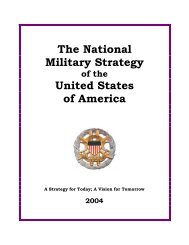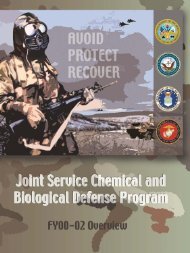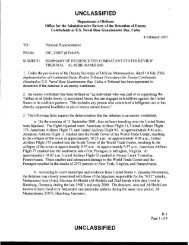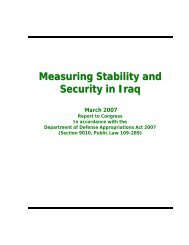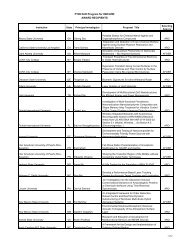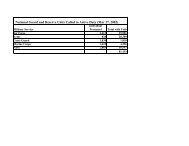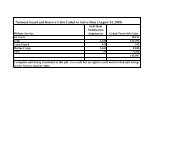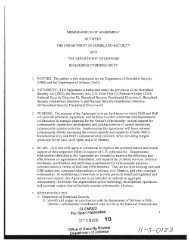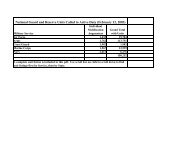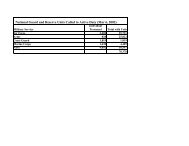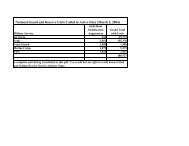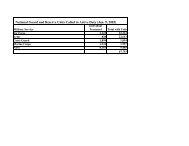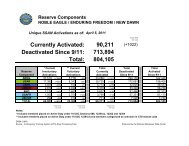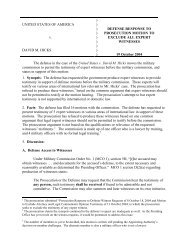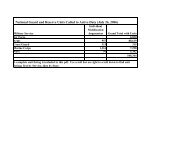Report - United States Department of Defense
Report - United States Department of Defense
Report - United States Department of Defense
You also want an ePaper? Increase the reach of your titles
YUMPU automatically turns print PDFs into web optimized ePapers that Google loves.
UNCLASSIFIED<br />
operations is the weakness <strong>of</strong> Afghanistan’s justice system. In many areas, links between the<br />
ANP and the justice system are weak or nonexistent. Corruption and police abuse <strong>of</strong> civilians<br />
remain problems in much <strong>of</strong> the country.<br />
As part <strong>of</strong> the transition <strong>of</strong> the ANP from a COIN force to one more focused on traditional police<br />
activities, the MoI decided to disband its ANP zone headquarters in March 2013. Disbanding<br />
will create an ANP command structure that is less reflective <strong>of</strong> the ANA structure but is more in<br />
line with the structure <strong>of</strong> most non-wartime police forces. The full implementation and<br />
consequences <strong>of</strong> this decision had yet to occur as <strong>of</strong> the end <strong>of</strong> the reporting period.<br />
The ABP and ANCOP continue to be used to support traditional COIN efforts as well as to<br />
enable or support ANA operations. Although the ABP continues its COIN mission, the force is<br />
making an effort to shift more <strong>of</strong> its focus towards the traditional border mission, including<br />
training, equipping and pr<strong>of</strong>essionalizing the force at the major border control points (BCPs) and<br />
airports <strong>of</strong> entry.<br />
Unfortunately, insurgent attacks, continued corruption and limited literacy across the force<br />
continue to undermine positive police recruiting, training and pr<strong>of</strong>essionalization goals as the<br />
ANP is generated and fielded. The January 2013 attack against the Traffic Police Headquarters<br />
in downtown Kabul is an example <strong>of</strong> the insurgent attacks that are increasingly targeting the<br />
ANP.<br />
Another challenge facing the ANP is command and control. The ANP Command and Control<br />
structure is overly complex. Communications between Kabul and the provincial and district<br />
police departments is minimal. Furthermore, the MoI has little authority over the Provincial<br />
Chiefs <strong>of</strong> Police (PCOPs) and District Chiefs <strong>of</strong> Police (DCOPs), and the authority the MoI does<br />
possess is impacted by political interference. In the future, this problem may be exacerbated by<br />
the recent decision to disband the police zones system. Finally, the lack <strong>of</strong> a dedicated civil<br />
service component <strong>of</strong>ten results in police <strong>of</strong>ficers being pulled from patrol duty in order to<br />
perform administrative actions.<br />
These issues are exacerbated by the ANP’s continuing problems in the area <strong>of</strong> communications.<br />
Difficult terrain, the inability <strong>of</strong> the ANP to repair inoperable radios and unreliable radio<br />
communications all contribute to this problem. Many AUP and ABP units continue to rely on<br />
cell phone communications as their primary means for communicating to Operational<br />
Coordination Centers (OCCs) and higher police HQs. Cell phone usage is also an issue in areas<br />
where power is inconsistent and cell towers do not function for several hours during the day.<br />
Corruption and the impact <strong>of</strong> local power brokers on the ANP vary by unit. The further ANP<br />
units are positioned from government centers, such as Kabul or provincial centers, the more<br />
likely the units are to feel the influence <strong>of</strong> tribal or traditional power brokers. Rural-based ANP<br />
units are also much more likely to succumb to Taliban and criminal patronage network influence.<br />
This influence may materialize in the form <strong>of</strong> non-aggression pacts, bribery or collusion with<br />
criminal networks. Endemic corruption and local power broker interference can lead to violence,<br />
as was seen with former Baghlan-e Jadid District Chief <strong>of</strong> Police LTC Kamin and former District<br />
Civil Order Police Chief Amir Gul in fall <strong>of</strong> 2012. Both men were complicit in extortion <strong>of</strong> local<br />
79



